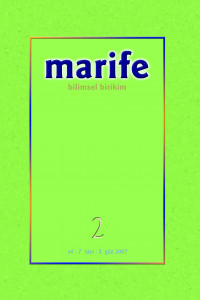Abstract
Importance of mind is very clear for all scientific disciplines. The fact that
in Islamic Theology alongside with al-Mu’tazila, al-Ash’ari (d. 324/935) did not consider
the belief of a human being who did not use intellectual proof as valid forms
one of the extreme application fields. However, as far as the methodology and
conclusions are concerned, there are significant differences between al-Ash’ari and
al-Mu’tazilah. According to al-Ash’ari, a human being should have intellectual
proofs in the creation of world, existence of God and His attributions for validity of
his belief. Nevertheless, the source of this necessity is religious texts, not his mind.
In this article, it will be attempted to find answers to some questions by examining
the balance which al-Ash’ari tried to set up between the mind and the religious
texts. In fact, does al-Ash’ari consider the belief of al-Muqallid as invalid? If he
does not consider it as invalid, how should his words in this subject be interpreted?
If he considers it as invalid, is this opinion a trace of the Mu’tazili period and an effect
from which he could not recover himself? Or, as far as his understanding of
knowledge is concerned, does it have an unrelated position with al-Mu’tazilah?
Abstract
Aklın önemi tüm bilim dalları için son derece açıktır. Kelam ilminde Mu'tezile ile birlikte Eş'arî’nin, aklî delil kullanmayan bir kişinin imanının geçerli saymamaları bunun ileri derecedeki uygulama alanlarından birini oluşturmaktadır. Ancak Eş'arî ile Mu'tezile arasında konuya yaklaşım ve sonuçları itibariyle ciddi farklılıklar vardır. Ona göre bir kişinin imanının geçerli sayılabilmesi için âlemin yaratılışı, Allah'ın varlığı ve sıfatları konularında aklî delile sahip olması gereklidir. Bununla birlikte bu gerekliliğin kaynağı aklı değil nasslardır. Bu makale Eş'arî’nin akılla nass arasında kurmaya çalıştığı dengeyi inceleyecek bazı sorulara cevap arayacaktır: Gerçekte Eş’arî mukallidin imanını geçersiz mi saymaktadır? Geçersiz saymıyorsa onun bu konudaki sözlerini nasıl yorumlamak gerekir? Geçersiz sayıyorsa bu görüşü Mu'tezilî döneminden kalan bir iz ve kurtulamadığı bir etki midir? Yoksa onun bilgi anlayışı içerisinde Mu'tezile ile ilgisiz bir konuma mı sahiptir?
Keywords
Details
| Primary Language | Turkish |
|---|---|
| Subjects | Religion, Society and Culture Studies |
| Other ID | JA83FV77NY |
| Journal Section | Technical Brief |
| Authors | |
| Publication Date | September 30, 2007 |
| Published in Issue | Year 2007 Volume: 7 Issue: 2 |
This work is licensed under a Creative Commons Attribution-NonCommercial 4.0 International License.

